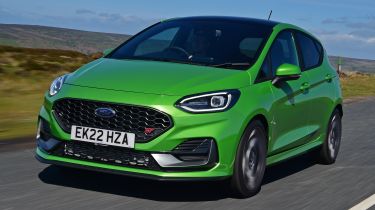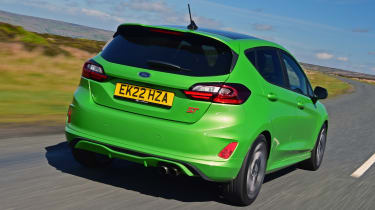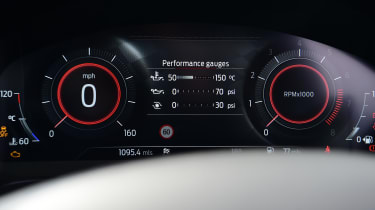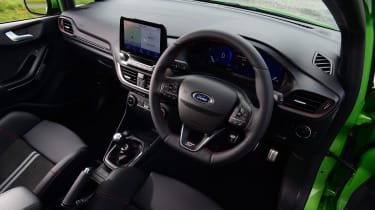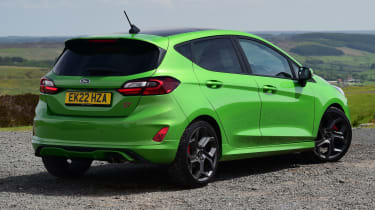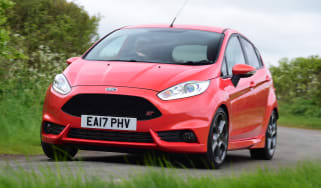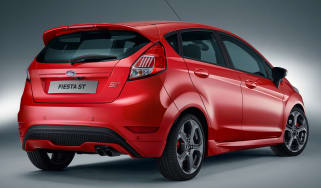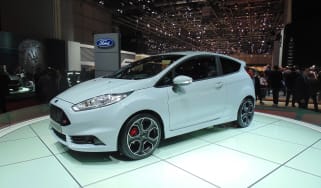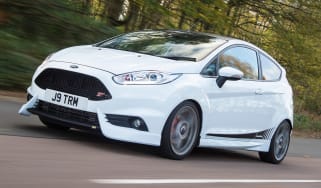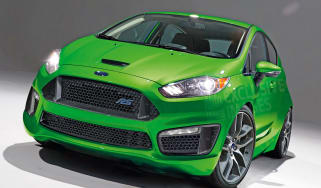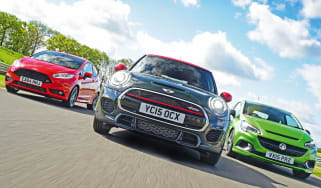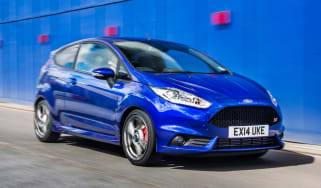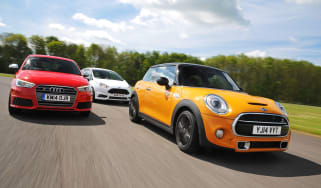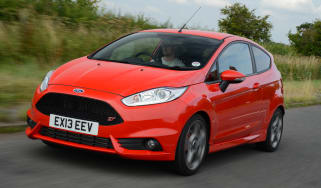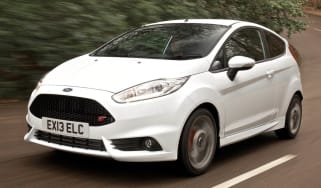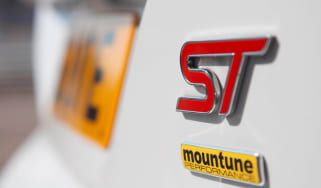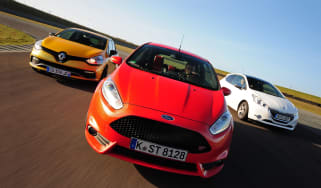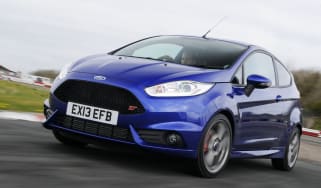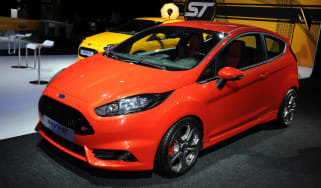Ford Fiesta ST (2017-2023) review
Ford’s Fiesta ST is still a vibrant, exhilarating hot hatch to drive, although it's now a little expensive to buy

More accomplished it may be, but the latest Ford Fiesta ST is as fun as its brilliant predecessor. Prices have crept up but the driving experience alone will convince you it’s worth it, and the Fiesta ST is still one of the best small hot hatches on the market. Yet dial things back and it’s reasonably economical, not to mention comfortable, and there’s a decent level of standard equipment.
About the Ford Fiesta ST
The Ford Fiesta has a long but complicated history when it comes to performance derivatives. Over the course of almost four decades hot Fiestas have appeared under various naming strategies - unsurprising given that the Fiesta is often Britain’s most popular car. Sub-par RS Turbo and mild Zetec S cars have been and gone, and while XR2 and XR2i badged Fiestas lay claim to being icons, it’s the more recent ST badged Fiestas that have really put Ford’s hot supermini on the map.
The first Fiesta ST arrived in 2005 based on the fifth-generation Fiesta supermini - known as the Mk6 in the UK – and packing 150bhp from a naturally aspirated 2.0-litre engine. Although the Mk7 Fiesta arrived in 2008, fast Ford fans had to wait until 2013 for another ST version. With up to 197bhp on overboost from a turbocharged 1.6-litre four-cylinder engine, sweet handling, a superb chassis, a tactile gearbox and an enticing price tag compared to rivals, it quickly established itself as the hot supermini benchmark.
Used - available now

2015 Land Rover
Range Rover Evoque
73,197 milesAutomaticDiesel2.2L
Cash £15,000
2023 MINI
Cooper Electric
54,250 milesAutomaticElectric
Cash £11,295
2024 Audi
A3 Sportback
14,266 milesAutomaticPetrol1.5L
Cash £21,920
2023 Mercedes
EQC
28,251 milesAutomaticElectric
Cash £28,197Fast-forward to the present day and the third Fiesta to wear the ST badge arrived just a year after the standard Mk8 car. A rival for the Volkswagen Polo GTI, MINI Cooper S and now the Hyundai i20 N, the car’s ethos remains much the same, but there’s a big change under the bonnet. This is a three-cylinder hot hatch, its new 1.5-litre unit heavily turbocharged to make up for a lack of capacity.
Potential Fiesta ST buyers may still have a decision to make once they’ve entered the Ford dealership, as the Blue Oval brand now sells a Puma ST too. The performance Puma uses the same recipe as the five-door Fiesta, and is nearly as good to drive, but comes with a bit more space inside.
The Fiesta range received a facelift in 2021, with the ST model including a revised front bumper design, deeper side skirts, a Ford Performance front splitter and a body-coloured diffuser. 18-inch Magnetite alloy wheels and a new Mean Green body colour are also available. The ST's cabin now features Ford-designed Performance bucket seats in place of the previous Recaro items, while a flat-bottomed steering wheel with red stitching adds to the sporty feel.
Keen drivers will be pleased to hear that peak torque has risen from the previous model's 290Nm to 320Nm, although the ST's 0-62mph time of 6.5 seconds remains unchanged.
Ford used to offer the Fiesta ST in a range of trim levels; ST-1, ST-2, ST-3 made up the core of the lineup, with other special editions produced in limited numbers. The facelifted model is now solely available in top ST-3 specification, which means buyers will benefit from a high level of standard kit. The downside is there's no cheaper entry-level car on the price list any longer, so you'll need around £27,000 to buy the latest car.
Engines, performance and drive
The old Ford Fiesta ST was always going to be a hard act to follow, and with such a substantial change under the bonnet, Ford has taken the opportunity to reconfigure the Fiesta ST’s character a bit.
Open the door and you’ll climb into the new Ford Performance bucket seats that feel huge in the cockpit. Fire up the Fiesta though, and you’re immediately introduced to the main event: the engine.
With three cylinders on board rather than four the engine note has changed drastically, though Ford’s engineers have attempted to compensate for the loss of a cylinder. Unlike the previous generation car with its predisposition to rev freely, the new Fiesta ST’s engine note is much bassier, and the torque curve means there’s little to gain from pushing it beyond 5,500rpm. The exhaust now crackles when the car is toggled into its Sport or Race driving modes though, and the Fiesta ST is much more vocal from outside – you’ll definitely notice one passing.
Overall it’s a brilliantly punchy unit with more torque than before, mated to a six-speed manual gearbox as slick in operation as you’d hope it to be. The Fiesta’s steering remains sharp and nimble, creating the desired impression of an agile, small car with bags of grip. There’s less jarring through the wheel on rough surfaces, but it’s just not quite as communicative or natural feeling as the setup in the older car.
The softer steering is joined in the ST by a more supple suspension setup. On the face of it, the alterations impress and this is a much more comfortable car, both around town and on long journeys, than before. The new car doesn’t feel quite as raw and connected with the road as its crashier predecessor, but the ride is still firm, composed and ensures the car flows down a typical B-road superbly.
The Fiesta ST is the best in class in terms of ride and handling balance, thanks mainly to its brilliant damping. The system is called Ride Control 1, and it’s a passive setup that can firm things up during hard cornering but ease off when less demand is placed on the car’s grip reserves. Edge the Fiesta ST into one of its racier driving modes, and the ESC will relinquish a bit of its hold on the chassis and throttle allowing some slides.
You can now skip the Fiesta’s decent torque vectoring setup and opt for a proper mechanical limited slip differential, too - thus unlocking even more front-end grip and adding another dimension to the car’s stellar handling characteristics. The standard Performance Pack it is grouped into also includes launch control and a shift prompt light on the dashboard.
0-62mph acceleration and top speed
A new 1.5-litre three-cylinder turbo with cylinder deactivation technology makes its way under the Fiesta ST’s bonnet and is a key element of the overall experience. It’s bassy and sounds distinctly more imposing than the old 1.6-litre on start up. Overall, it makes much more noise, even though it doesn’t rev out quite as hard at the top end.
Ford quotes 197bhp for the unit, with the facelifted model including an increase in torque, from 290Nm to 320Nm - an impressive figure in a car of the Fiesta’s size which means it feels on edge and urgent when the turbo is in play. Power is delivered low down and stays on call until around 5,500rpm, with the 6,000rpm redline arriving not soon after.
MPG, CO2 and Running Costs
The Fiesta’s downsized engine, compared to the four-cylinder norm in this class, means that it boasts some impressive fuel economy figures, and in the real world it’ll definitely be cheaper to run than its predecessor. Officially, Ford claims that the new Fiesta ST will return 42.2mpg, with CO2 emissions of 151g/km. In real world conditions, and as we’ve found on test, fuel economy in the mid-30s is what you can expect.
A cylinder deactivation system is present on this car. This means that, given the chance, the new engine will actually shut down into two-cylinder mode. While that might sound a little off-putting if your primary concern is driving fun and instant response from the unit, you’ll be pleased to hear that the deactivation and reactivation of the third cylinder is seamless and virtually undetectable from behind the wheel.
Insurance groups
The Fiesta ST occupies insurance group 26. That puts it on par with the MINI Cooper S, but three above the latest Volkswagen Polo GTI. The Hyundai i20 N is in group 27.
Depreciation
Our experts anticipate that the Fiesta ST will retain around 56 per cent of its value over three years and 36,000 miles.
Interior, design and technology
The Ford Fiesta is one of the most common sights on British roads, and by and large the ST version will slip by unnoticed, as its sporty design shares much in common with the popular ST-Line version of the regular car. There’s a honeycomb grille up at the front with unmistakable red ST badging, but aside from that the only noticeable changes are black inserts on the sporty front bumper, the ST’s unique alloy wheel design, a lower stance, a subtly different rear bumper and a twin exit exhaust setup.
Access the cabin and the changes are more evident. You can’t miss the Ford Performance bucket style sports seats, while elsewhere there’s faux carbon-fibre trim on the dashboard, an ST emblazoned steering wheel, a chrome effect gear lever and bespoke instruments.
Sat-nav, stereo and infotainment
Digital dials represent a tech boost for the ST, but it’s a pity that the recent facelift didn’t introduce a revised touchscreen at the same time. Ford has elected to stick with the SYNC 3 infotainment system instead of its latest SYNC 4 software (as fitted to the updated Focus), which means that what you get here is nothing more than okay.
The blue graphics are a little monotone and the resolution of the eight-inch display can’t compete with rivals such as the Hyundai i20 N and Volkswagen Polo GTI. Nor can the interface itself; the menu pages aren’t as intuitive as the i20’s or Polo’s, and the loading times are slower. Apple CarPlay and Android Auto are standard, so it’s easy to make use of the superior resources at your smartphone’s disposal.
There’s not much in the way of ST-specific functions, although the graphics of the instrument panel change depending on which drive mode is selected.
Practicality, comfort and boot space
The Ford Fiesta ST is credible as a performance car, and it should prove to be a fairly straightforward supermini to live with day to day too, given the base car has already proven itself in this regard. It's only available as a five-door model now, which adds to its more practical, usable nature.
Size
The Fiesta is 4,068mm long, 1,469mm tall and 1,941mm wide, so it’s right on the money for a car in this segment, and you’ll feel little difference between the Fiesta and the rest of the class. It’s not as wide as the Polo GTI though, which feels a bit more spacious inside thanks to its additional shoulder room.
Leg room, head room & passenger space
The Fiesta ST boasts a decent amount of room overall. Up front driver and passenger will find plenty of space, and visibility all around is good. The only sub-optimal areas being the slim rear window and thick C-pillars that hinder the view out to the rear. We’ve found the Fiesta to boast more room in the rear than the MINI Cooper S, while there are Isofix points for child seats included.
Boot
The Fiesta’s boot sizes up at 311 litres with all seats in place. It’s a useful size and larger than the boot in the hot MINI, albeit smaller than the Polo and i20 N, while the space and boot opening are user friendly too. Fold the rear bench flat and the Fiesta opens up to accommodate 1,093 litres.
Reliability and Safety
Tested in 2017, the regular Fiesta received a maximum five-star safety rating from Euro NCAP. Standard equipment includes the NCAP pack which features a lane-keeping alert system, speed limiter and auto headlights.
The High Series Driver Assistance Pack is a £550 option for the ST-2 and ST-3 cars, and includes an autonomous emergency braking function and a blind-spot detection warning.
We named the Fiesta our Supermini of the Year in 2019, and also commended the Fiesta ST in the Hot Hatch category. However, customer feedback from our 2021 Driver Power Survey saw the Fiesta finish in 68th place (out of a 75-car list), while Ford itself came 25th out of 29 car brands - a position the manufacturer will want to improve on.
Warranty
The Fiesta is offered with Ford’s standard warranty. That means the car is covered for three years or 60,000 miles (whichever comes first) with unlimited miles in the first year.
Servicing
To avoid paying for more expensive individual services, customers have the option of investing in a Ford Protect service plan. You can choose either monthly payments or one upfront payment, while the plan also extends your Ford Assistance breakdown cover.

